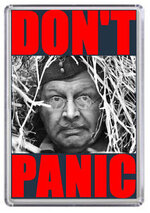C
Chase Gamwell
Guest
I recently got some feedback on a manuscript I'm working on, and a word analysis was included with the feedback. Along with the word analysis came a suggestion that I expunge all adverbs from my manuscript (if possible). And the comment was paired with a quip about Stephen King not liking adverbs.
I guess my question is this: how much adverb usage is too much? if I use adverbs, is an agent going to relegate my manuscript to the "naughty pile"?
I'm far from a perfect writer, so I'm trying to take every bit of feedback I get seriously. But I'd also like to hear what everyone on the colony thinks. Do you use adverbs? Am I a naughty writer for employing them enough to have someone mention it? Do you feel that the use of adverbs detracts from the quality of the work?
I guess my question is this: how much adverb usage is too much? if I use adverbs, is an agent going to relegate my manuscript to the "naughty pile"?
I'm far from a perfect writer, so I'm trying to take every bit of feedback I get seriously. But I'd also like to hear what everyone on the colony thinks. Do you use adverbs? Am I a naughty writer for employing them enough to have someone mention it? Do you feel that the use of adverbs detracts from the quality of the work?

